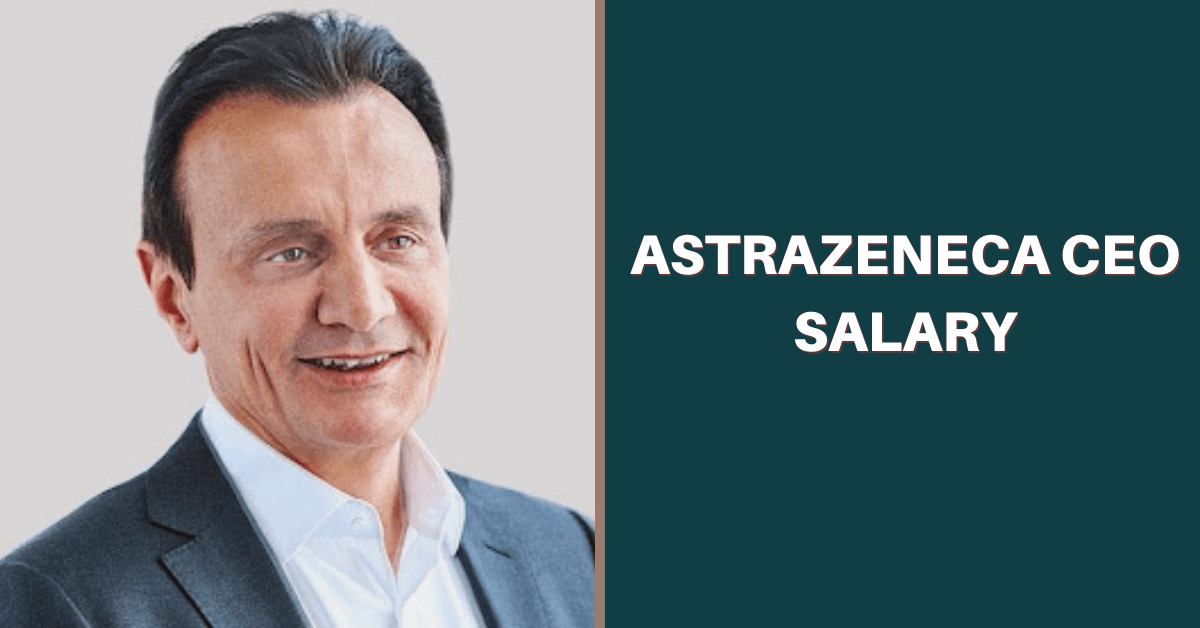The CEO of AstraZeneca, Pascal Soriot, earns an annual salary of $21.5 million. This blog will take a closer look at what makes up the astrazeneca ceo salary and why it is set at this amount. In addition to looking at the income from his position as head of the company, we will also have a bit of a look at how much money he could potentially earn from other sources such as share sales and bonuses.
You might be interested to know about Pfizer CEO salary and Moderna CEO salary also.
What is the salary of the AstraZeneca CEO?
The salary of Astrazeneca’s CEO, which is the highest-paid member of the company, is $21.5 million per year. In addition to his fixed annual salary, the AstraZeneca CEO also has a ton of additional financial incentives and benefits that allow him to earn more bonus money.
When we look into Pascal Soriot’s compensation package it is possible to see what exactly contributed to his highest income amount ever and how much he can potentially earn from other sources such as stock options.
The total astrazeneca ceo salary for Pascal Soriot for 2015 was about $24.7 million, stemming from a fatty $8.9 million base salary and a potentially endless number of incentives. Holding stocks and stock options worth nearly $31.9 million, it is clear that Pascal Soriot has gained a lot of money from the potential future sale of AstraZeneca stock.
Because Pascal Soriot’s employment agreement has him on payroll until at least 2019, there is no telling what his next 6-figure paycheck will be, however knowing that the current package puts him far ahead we can have faith in him cashing in sometime soon as well.
Who is Pascal Soriot?
Pascal Soriot is the CEO of AstraZeneca, an international pharmaceutical company. He studied MBA from HEC Paris.
On May 23, 1959, Pascal Soriot was born in France. When he was 20 years old, his father died. A graduate of the Paris-based École nationale de médecine animale d’Alfort at Maisons-Alfort, He went on to get an MBA from HEC Paris after that.
The pharmaceutical business Roussel Uclaf (which was owned by Hoechst AG until 1997 when it was acquired by the Swiss conglomerate) hired him to be a salesperson in Australia back in April 1986. He joined Hoechst Marion Roussel in Australia in 1996 and moved to Tokyo in April 1997 as General Manager.
As of 2006, he has been employed at Roche. He served as CEO of Genentech, a division of Roche, from April 2009 until 2010. Chief Operating Officer of the pharmaceutical company Roche Pharma AG, he rejoined in 2010.
The world’s fifth-biggest pharmaceutical company, AstraZeneca, announced in August 2012 that he will be its next CEO at the age of 53.
AstraZeneca Company Profile
AstraZeneca is a pharmaceutical company that specializes in developing medications for chronic and rare diseases. It was founded on April 6, 1999, and has since grown to become one of the world’s largest drug companies.
As a biopharmaceutical company, AstraZeneca (AstraZeneca) develops, manufactures, and distributes a broad variety of prescription medications. In addition to autoimmune, infectious, and neurological illnesses, it focuses on the treatment of respiratory, cardiovascular, renal, and metabolic problems.
What are bonuses and how do they work?
A bonus is a one-off payment that companies offer to their employees in recognition of achievement. It can be given for completing a project on time or meeting targets set by the company. Bonuses are often used as incentives to ensure that employees are motivated enough to reach their goals.
Bonuses are also common for reaching certain milestones or achieving certain levels of performance, such as the case with Pascal Soriot. Bonuses are usually paid in cash, shares, or both.
The AstraZeneca CEO has plenty of bonuses that add to his salaries and which may increase his top-earning amount along with receiving annual stock and stock unit awards.
In addition to possible bonuses as a percentage of a fixed income and/or by several million dollars, there is also the possibility that Soriot can increase both his gross, bonus, and net income with several different awards including:
- Stock Options
- Flexible Comp Term Incentive Awards (Flex I)’s
- Cash Consideration Payments instead of (not in addition to) certain employees’ continued employment
- Homegrown Commodities Incentive Plan (HCI)
- Astra Zeneca Limited-Term Incentiveness Plan (2005)
Conclusion
AstraZeneca is a global biopharmaceutical company that focuses on discovering, developing, and commercializing innovative therapies in the fields of oncology, cardiology, metabolic diseases, inflammation, respiratory, and autoimmunity. It also develops at-risk medicines for pandemic influenza and other infectious diseases. AstraZeneca’s headquarters are in Cambridge, United Kingdom.
AstraZeneca’s CEO is Pascal Soriot. Soriot has been CEO of AstraZeneca since 2012. He has a long history in the pharmaceutical industry and was a previous executive at Roche Holding AG. The current astrazeneca ceo salary is $21.5 million per year annually ($413461/week). The CEO’s salary includes a base salary and a variable element that is linked to performance.

